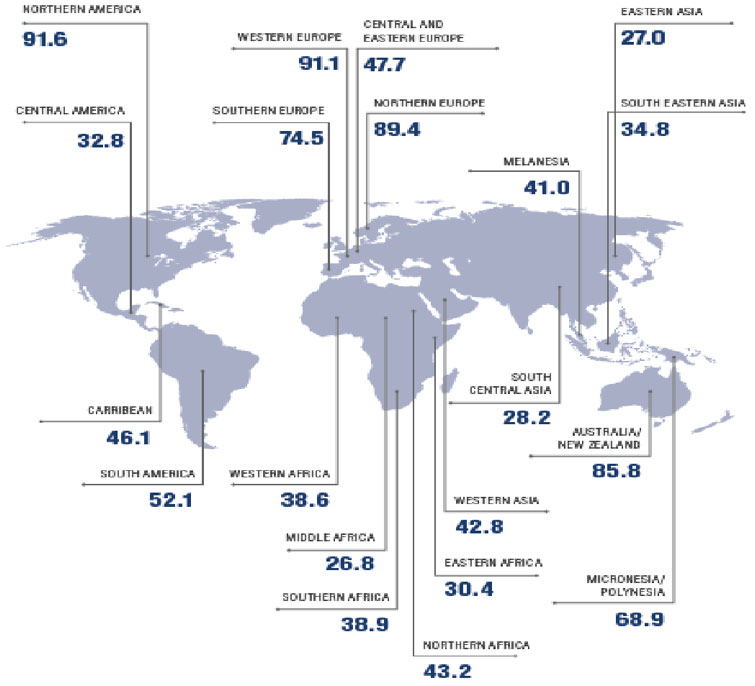Breast Cancer Facts
Breast Cancer is a cancer that forms in the tissues of the breast – usually in the lobules or ducts.
It occurs in both men and women, although Male Breast Cancer is rare. Ductal cancer is the more common variety.
Breast Cancer is a leading cause of cancer-related deaths in women, with almost 1.7 million diagnoses per year, and more than half a million deaths annually. Female Breast Cancer incidence rates vary widely between regions, with the highest incidence rates in Western Europe and the United States, and the lowest in Africa and Asia.
The figure below, which presents findings from the year 2012, shows the number of new Breast Cancer diagnoses per 100,000, according to regional population.

Risk factors
• Female gender
• Increasing age
• Having fewer children
• No breastfeeding
• Genetic predisposition
• History of atypical hyperplasia (overgrowth of breast tissue)
• Obesity
• Exposure to estrogens
• Alcohol
Symptoms
The symptoms include one or more of the following –
• A lump in the breast
• Change in the size or shape of the breast
• Dimpling or reddening of the skin of the breast, or thickening of the breast tissue
• Nipple inversion, discharge
• Swelling or a lump in the armpit
• In conjunction with these, any bone pains, persistent cough, and yellowing of the eyes
How to diagnose?
As soon as a patient reports any of these symptoms, a thorough clinical examination—including a bilateral breast and axilla examination, and an examination of the neck—is required. In order to characterize the breast disease, a bilateral mammography (breast X-ray) is then performed, followed by a small needle biopsy to prove the disease pathology and discover the hormonal and other receptor status of the cancer – as these can be targeted specifically with drugs. In locally advanced cases, we usually perform a CT scan to check whether the disease has metastasized.
Treatment
The good news is that, if detected early or in locally advanced stages, Breast Cancer is usually a curative disease. Even in an advanced metastatic stage, there are chances of long-term control and survival benefits—especially in light of the treatment options available today.
Treatment options include:
1. Surgery: the mainstay of treatment in early and locally-advanced disease. Removal of only the tumor and conserving the healthy breast tissue is the norm.
2. Chemotherapy: mainly used post-surgery in early Breast Cancer to improve survival; in some cases of locally-advanced cancers, it is used before surgery to decrease the size and extent of the cancer as well as to improve outcomes.
3. Hormonal therapy: Breast Cancer is a hormone-dependent tumour in almost 60% of cases and thus responds to hormonal manipulation (in the form of tablets and injections) very well. These tablets are quite inexpensive and give long-term benefits in all stages.
4. Targeted therapy: very useful in cases where the cancer is positive for the specific receptor (e.g. Her2). This particular form of therapy comprises monoclonal antibody injections or tablets, and is used either alone or in conjunction with chemotherapy and hormonal therapy.
5. Radiation therapy: useful in preventing local disease re-occurrence post-surgery; also helpful if the disease has spread to the bone and/ or brain.
Quality of life post-treatment
Breast Cancer is a largely curable disease with over an 80% survival rate in the early stages, and more than a 65% survival rate in locally-advanced Breast Cancer. The usual recommendation is three-monthly routine medical checkups for the first two years followed by six-monthly checkups for the next three years.
Even in the advanced metastatic disease, given the wide array of options now available, both survival and quality of life are constantly improving.
It is imperative, therefore, that a patient consult the doctor immediately if they suspect any of the above-stated symptoms. Prompt expert evaluation is key to optimizing one’s survival benefits.
After all, Breast Cancer is curable if detected early enough.
Dr. Subhadeep Bose
Medical Oncologist
Bahrain Specialist Hospital
Email: [email protected]


































